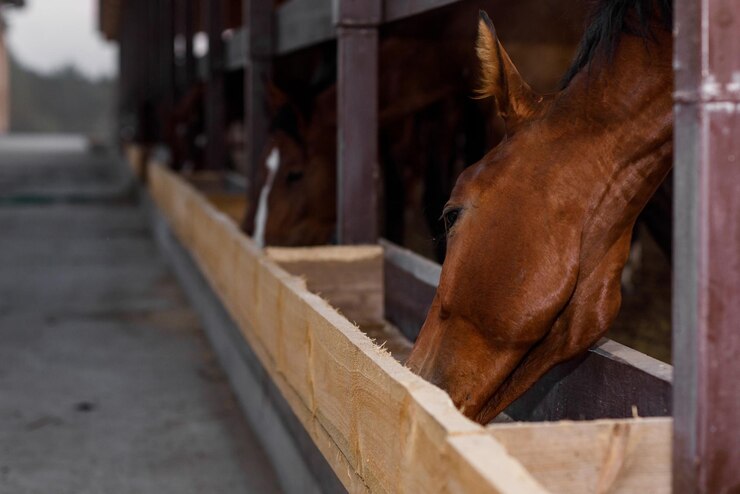Ensuring that your endurance horse receives the best nutrition is crucial for its performance and overall health. The right horse feed for endurance horses plays a pivotal role in maintaining energy levels, enhancing recovery, and promoting optimal performance during endurance events.

Importance of Nutrition in Endurance Horses
Unlike other types of performance horses, endurance horses require a diet that supports sustained activity over long periods. Their nutritional needs are unique, and understanding these needs helps in selecting the appropriate horse feed.
Energy Sources for Endurance Horses
Endurance horses derive their energy primarily from a balanced mix of carbohydrates, fats, and proteins. Carbohydrates provide quick energy; however, fats are a more dense energy source that supplies endurance horses with long-lasting energy. For more information on nutrient deficiencies, visit this article.
Protein and Its Role
High-protein diets are not typically required for endurance horses, but adequate protein is necessary for muscle repair and recovery after long rides. A balanced level of protein ensures that the muscles remain healthy and function effectively.
Essential Vitamins and Minerals
The nutritional plan for endurance horses must include essential vitamins and minerals like Vitamin E and selenium which are crucial for muscle health. You can learn more about Vitamin E’s importance in horses here.
Hydration: Not Just Water
Proper hydration is more than just providing water. Electrolytes help maintain fluid balance and nerve function, especially during long endurance rides. They should be included in the diet of endurance horses regularly.
Choosing the Right Horse Feed
Selecting the right feed involves understanding the dietary needs specific to your horse’s level of training, climate, and workload. It’s advisable to consult with equine nutritionists to create a custom feed blend suited for your horse’s needs. For options on custom horse feed, visit here.
Grain-Free Options
In recent years, grain-free feeds have gained popularity, offering benefits such as improved digestion and energy stability. If considering a grain-free diet, take a look at more information here.
Including Probiotics
Probiotics can be an important component in a horse’s diet, particularly for maintaining gut health and improving digestion. Various horse feeds with probiotics are available and can be explored here.
Feeding Strategy: Timing and Amount
The timing and amount of feeding are crucial in ensuring that your endurance horse gets the maximum energy and nutrients from its feed. It’s advisable to feed small, frequent meals instead of large ones to maintain consistent energy levels. Following this strategy helps in better nutrient absorption and reduces the risk of colic.
Monitoring Your Horse’s Performance
Regularly monitor your horse’s performance and health indicators. Adjustments to your feeding strategy may be necessary based on your horse’s energy levels, recovery rate, and overall health. Consider looking into top-rated horse feed options for improving diet quality here.
The Role of Affordable Feeds
While quality feed often comes at a cost, there are affordable options that do not compromise on quality. Exploring various sources for budget-friendly horse feed without cutting back on nutrition can save costs while ensuring your horse remains in peak physical condition. More on budget-friendly options can be found here.
Training and Its Impact on Nutritional Needs
The training regime of your horse will affect its nutritional needs. Horses undergoing intense training require different nutrients compared to those in light training. Adjusting their diet in accordance with their training levels ensures they perform optimally.
Balancing Diet and Workload
By balancing a horse’s diet with its workload, you can ensure it gets the energy and nutrients it needs to perform efficiently. Understanding the balance is crucial to avoid nutrient deficiencies or excess.
Consulting Professionals
Working with equine nutritionists or veterinarians can help tailor a diet that is best suited for your endurance horse. They can provide insights and recommendations based on your horse’s specific needs.

FAQ Section
Q1: What is the best type of horse feed for endurance horses?
A1: The best type of horse feed includes a balanced mix of carbohydrates, fats, proteins, essential vitamins, and minerals tailored to the horse’s activity level and environment. Consulting an equine nutritionist is recommended.
Q2: How do I know if my endurance horse’s diet is effective?
A2: If your horse maintains its energy levels during endurance rides, recovers quickly afterward, and exhibits overall good health, these are indicators that the diet is effective.
Q3: Can I use the same feed for endurance horses as I do for other performance horses?
A3: Endurance horses have unique dietary needs for long-lasting energy and recovery. While some feeds may overlap, it is important to cater specifically to the endurance horse’s requirements for optimal performance.
This article contains affiliate links. We may earn a commission at no extra cost to you.






